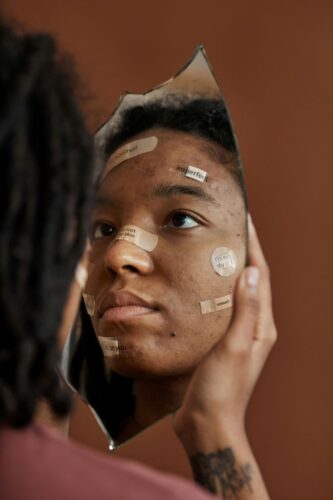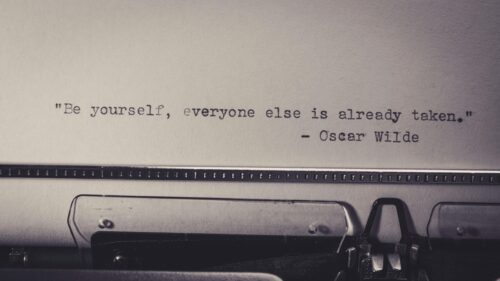Conquering Low Self-Esteem: How to Overcome Adversity, Self-Criticism
 “Why am I so hard on myself?” It’s a question everyone has asked themselves at some time in their life.
“Why am I so hard on myself?” It’s a question everyone has asked themselves at some time in their life.
We all go through periods of trial and tribulation, and it’s easy to be hard on yourself when you think you’re not measuring up as well as you think you should. This can create a vicious cycle by giving yourself a personal challenge goal, and when you struggle with it, you think you’re not good enough, encounter low-self esteem as a result, and give up.
When we fall into the slump of having low self-esteem and hyper-attacking our own inner demons, so to speak, it’s easy to forget that everyone encounters failure. It’s normal, natural even, as it is often the key to defining yourself and how you deal with things not going your way. Simply put, we fail, because it helps us succeed.
Self-criticism is a complex emotional challenge that many individuals with autism experience deeply. Unlike typical self-doubt, the inner critical voice for autistic people can be more intense, persistent, and rooted in unique neurological experiences. Understanding this phenomenon requires a nuanced approach that acknowledges the specific ways autism intersects with emotional self-perception.
The Neurological Basis of Self-Criticism
Research in autism spectrum disorder (ASD) has shown that individuals often experience heightened sensory and emotional processing. This neurological difference means that social interactions, personal experiences, and internal thoughts can feel more overwhelming and significant.
The brain’s neural pathways in autistic individuals process information differently, which can contribute to a more pronounced internal dialogue of self-evaluation.
Neuropsychological studies have demonstrated that autistic individuals often have enhanced pattern recognition and detail-oriented thinking. While these can be remarkable strengths, they can also lead to more intense self-reflection and self-judgment.
When social interactions or personal performances don’t match the precise internal standards, the resulting emotional response can be particularly challenging.
RELATED: Breaking the Silence – The Startling Insights About Autism and Depression
Social Understanding and Self-Perception

This ongoing experience of navigating social interactions can breed a deep-seated worry about social performance.
Diagnostic criteria and clinical observations consistently note that autistic individuals may struggle with social communication. Misunderstandings or miscommunications can lead to repeated experiences of feeling different or misaligned.
Over time, these experiences can contribute to self-doubt that questions one’s social capabilities.
Instead of self-criticism, the question that should be asked instead is “Why am I so hard on myself?” and coupled with learning how to give yourself grace.
READ MORE: Autism Social Skills – Inferencing and Body Language Hurdles to Overcome
Emotional Processing and Self-Criticism
The emotional palette for autistic individuals is often more complex than neurotypical descriptions might suggest. Emotional experiences can be more intense, with feelings that are both deeper and more difficult to process.
This emotional intensity means that moments of perceived failure or social misalignment can feel monumentally significant.
Psychological research has explored how autistic individuals may experience emotions more comprehensively. What might seem like a minor social misstep to others can feel like a profound personal failure. This heightened emotional processing creates a fertile ground for self-critical thoughts to take root and grow.
Strategies for Managing Low Self-Esteem
Professional therapeutic approaches have developed specific strategies to help autistic individuals manage self-critical thinking. Cognitive behavioral therapy (CBT), when adapted to neurodivergent experiences, can be particularly effective.
The goal is not to eliminate self-critical thoughts entirely but to develop a more balanced and compassionate relationship with oneself.
Mental health professionals specializing in autism recommend several approaches.
Mindfulness techniques can help create space between oneself and intrusive thoughts. Cognitive reframing allows individuals to challenge and reconstruct negative thought patterns. Professional guidance can provide personalized strategies that respect the unique neurological experiences of autism.
RELATED: Helpful Self-Regulation Tips for Keeping Calm & Carrying On
Intersectionality and Complex Identity Experiences
The experience of self-criticism in autism becomes even more complex and often pronounced when considering intersectional identities. Autistics who also belong to marginalized communities face unique challenges that compound self-critical tendencies.

Women with autism, who were often ignored or overlooked entirely until fairly recently, exhibit traits very differently then men.
Autistic individuals from racial and ethnic minority groups often navigate multiple layers of social expectation and marginalization. The intersection of racial identity, neurodivergence, and social expectations can create complex patterns of self-criticism.
Cultural expectations, combined with the social communication challenges associated with autism, can intensify feelings of being misunderstood or inadequate.
Economic challenges can significantly impact self-perception for autistic individuals. Limited access to specialized support, educational resources, and therapeutic interventions can create additional barriers.
Research from disability studies demonstrates that socioeconomic status directly influences the ability to access supportive resources that can mitigate self-critical thinking.
Advanced Psychological Mechanisms for Overcoming Low Self-Esteem
Emerging research explores the intricate psychological mechanisms underlying self-criticism in autism.
The concept of “camouflaging”(masking) – where autistic individuals mask their natural behaviors to fit social expectations – plays a crucial role in developing self-critical thoughts.

Advances in neurochemical research provide deeper understanding of self-critical experiences. Autistic individuals often demonstrate different patterns of neurotransmitter activity, particularly in systems related to stress response and emotional regulation.
Studies exploring oxytocin and cortisol levels in autistic individuals have shown unique neurochemical profiles. These differences can contribute to more intense emotional experiences and potentially more pronounced self-critical thinking.
However, researchers emphasize that these are variations, not deficits – representing a different, equally valid way of experiencing emotional complexity.
Contemporary therapeutic models are evolving to address the specific needs of autistic individuals. Acceptance and Commitment Therapy (ACT) and Compassion-Focused Therapy are showing particular promise. These approaches move beyond traditional cognitive behavioral techniques, focusing instead on developing a more accepting and compassionate relationship with oneself.
Neurodiversity-affirmative practices emphasize understanding individual experiences rather than attempting to normalize them. This approach recognizes that self-criticism is not a personal failure but a complex interaction of neurological, social, and personal factors.
The Role of Community, Validation, and Support
Support communities play a critical role in mitigating self-critical and resulting low self-esteem experiences. Online and in-person networks specifically designed for autistic individuals provide spaces of genuine understanding. These communities offer more than support – they provide validation of diverse experiences and alternative narratives of self-worth.
Research from disability studies consistently demonstrates the transformative power of community validation. When autistic individuals find spaces that celebrate neurodivergence, they can begin to reconstruct internal narratives of self-perception.
Self-criticism in autism is not a simple psychological phenomenon but a complex interplay of neurological, social, and personal factors. Understanding requires moving beyond simplistic explanations, embracing the profound complexity of neurodivergent experiences.
The journey of managing self-critical thoughts is deeply personal and continuously evolving. It requires compassion, understanding, and a commitment to recognizing the inherent value of neurodivergent perspectives.
Seeking support from professionals who understand autism is crucial. Not all therapeutic approaches are equally effective for autistic individuals.
A therapist with specific expertise in autism spectrum disorder can provide more targeted and understanding support. They can help develop coping mechanisms that work with an individual’s specific neurological profile rather than against it.
Support groups specifically for autistic adults have also shown significant benefits. These communities provide a space where individuals can share experiences, develop coping strategies, and feel understood. The validation of shared experiences can be a powerful tool in combating persistent self-criticism.
Recognizing Strengths and Unique Perspectives

Scientific research continues to expand our understanding of neurodiversity. The narrative is shifting (finally!) from viewing autism as a deficit to recognizing it as a different, equally valid way of experiencing and understanding the world. This perspective shift is critical in helping autistics develop more compassionate self-understanding.
The journey of managing self-criticism is ongoing. It requires patience, understanding, and a commitment to self-acceptance. No single approach works for everyone, and individual experiences of autism are profoundly diverse. What remains consistent is the importance of treating yourself with kindness and understanding.
Professional support, community connection, and personal reflection can all contribute to developing a more compassionate internal dialogue. The goal is not to eliminate self-critical thoughts completely but to develop a more balanced, nuanced relationship with oneself.
Autism is not a condition to be cured or fixed, but a fundamental part of an individual’s neurological identity. Self-criticism can be managed, understood, and gradually transformed into a more supportive internal voice. After all, we should be our own greatest champion!
The most important thing in life — the trick on how to achieve success in anything you want in life — is persistence, no matter how times you fail you can always get back up and try again.
There is nothing wrong with failure because so much of life is trial and error, that’s why the simplistic message of “if at first you don’t succeed, then try, try, again” is crucial for research and life in general.
Misconceptions About Autism that Lead to Stigmas and Stereotypes
Learn more about other stigmas and stereotypes that autistics face, which often leads to low self-esteem:
- Why Labeling People Can Lead to Stereotyping and Discrimination
- Autism Media Stereotypes: We’re Not All Geniuses, Savants, or Lonely
- Beyond Stereotypes: How Rain Man Revolutionized the Perception of Autism
- Absurd Plot About Autism and Evolution and Why It’s Harmful
- Moving Past the Tired Conspiracy Theory of Vaccines and Autism
- 3 Reasons Why Pathologizing Crushes Autism Acceptance and Inclusion
- The Hidden Hurdles: Challenging Autism Stigmas in Today’s Politics
- History of Autism: Revealing Shocking Mysteries from the Past
- Knocking Down the Stigma to Autism Obsession